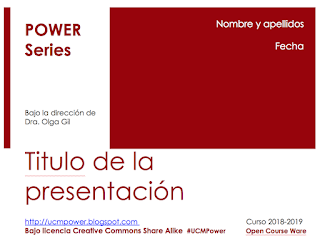He invitado a alumnos interesados en la asignatura a que nos la introduzcan a través de un video que será punto de partida para plantearnos debates en cursos anteriores como:
- ¿Qué podemos esperar de la asignatura, y como diseñarla entre todos específicamente para ello?
- ¿Qué habilidades podemos desarrollar junto con los nuevos conocimientos que vamos a adquirir?
Espero que estos videos os interesen para aprender y aprovechar al máximo este periodo de aprendizaje. Desde mi óptica, se trata de trabajos estupendos
Esta es la presentación que nos ha preparado Andrea Liendo, de cuarto curso:
Y esta es la presentación que nos ha preparado para compartir Sandra García Vieira, de cuarto curso:
Estos videos servirán para orientar a los nuevos alumnos. A mí me sirven para orientar futuros cursos y darme cuenta de la importancia de la preparación con los alumnos con la preparación de videos desde el principio, de forma que trabajemos juntos y mejoremos las presentaciones profesionales online como parte integral y práctica de la asignatura. Gracias por contribuir a hacer del curso 2021-2022 un curso muy interesante y a que la profesora termine el curso con muchas granas de superarse y lograr mejorar con los alumnos que se incorporan.
A todos los estudiantes, no sólo a los que incluímos en esta entrada de
blog, les quiero agradecer su compromiso con la asignatura. En este caso
agradezco mucho las valoraciones de la asignatura, que han alcanzado el
9,7, así como la actitud de los asistentes interesados en aprender, y
su dedicación que ha sido ejemplar en un curso aun muy difícil por el
COVID y la enseñanza a distancia.
¿Interesados en las aportaciones de estudiantes de otros cursos?
Me emociona también ver estos trabajos realizados por alumnos de primer curso, que quiero compartir para que sirvan de referente en el curso entrante a los nuevos alumnos. Esta es la presentación que nos ha preparado David Sancho, de primer curso
Esta es también la presentación que ha realizado LongZhongCao, de primer curso:




